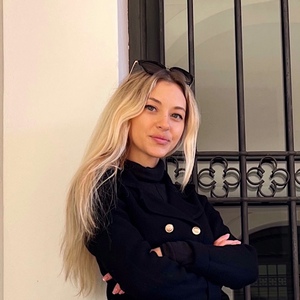Our testimonials: Anastasiia

Our testimonials: Anastasiia
Meet Anastasiia from Russia
Student of Clinical, Social, Intercultural Psychology
"Studying abroad will shape you both academically and personally, studying in Italy in particular will also for sure teach you some patience and resilience."

About myself
I was a cognitive-behavioural therapist in Russia before my relocation to Italy (this is my second Psychology master's). The fields of my interest are suicide prevention, brief crisis interventions, digital mental health solutions, and the relationship between nutrition and psychological well-being (metabolic psychiatry). My research has a focus on war-related discrimination and hate behaviours (supervised by Professor Valenti, who currently addresses related issues in the Council of Europe), and the main part of my work today is centred on helping people who were affected by the war in Ukraine. In my spare time I moderate a film club for psychologists in the Association for Contextual Behavioural Science, do a lot of yoga (constantly thinking of how to integrate it into therapy), and try to smoothly transition from life to Italy to life in the UK, following my recent move to London.
5 reasons to study Psychology at UNIPD
1) Italy. And I’m not just speaking about food and weather (although keeping it in mind). The amazing thing about studying in Italy is its grading system: the number of attempts that you have for each exam and the non-attending option. Universities in other countries might offer the same quality of education, but this opportunity of being flexible while not compromising on your GPA is something rare that you can hardly find anywhere else.
2) Padova. Padova itself is a little gem, and it is strategically located between 2 airports (one of which is low-cost). The city has it all: arts, culture, history, nature, but in the very unlikely case you need something else – you are always just a couple of hours away.
3) UNIPD. The University of Padova aims to give every type of benefit and support that you can think of: academic, financial, administrative, psychological. If you need a bank – they give you a card, if there is the world’s oldest botanical garden in the city – they give you free unlimited access (and much more).
4) School of Psychology. You study psychology from the people who develop it live-time on every level, both locally and globally. School of Psychology in Padova also has strong ties with other universities and mental health institutes, ensuring your potential Erasmus and future career opportunities.
5) Clinical, Social, Intercultural Psychology Programme. It was created 2 years ago and you can enjoy the best of all worlds in this program. On the one hand, you have the most experienced professors equipping you with the most holistic knowledge of psychology. On the other hand, the programme is still rather new, so the students are very much invited to co-create it and share their ideas on everything from the content of lectures to the format of exams (the process of studying is so democratic that it’s sometimes overwhelming for me as a Russian). There is also the star of this program Sara Mondini, who is non-stop looking for the most interesting speakers and improving whatever there is left to improve in the programme (and her email response time is less than 1 hour on average).
Career/Internship Opportunities - My Unipd experience
I’ve had the best-case scenario experience with the University of Padova from the very beginning. As a holder of Excellence scholarship, I was able to straight away connect with the people who received it in the previous years and have some very valuable advice for my career.
The process of arranging an Erasmus exchange semester in Lisbon was as easy as it could be. I wasn’t able to use it as I managed to get chickenpox right before the final enrolment, but I don’t regret it at all, as this semester in Padova turned out to be the most rewarding in the end. I took a Human Rights class, and Professor Valenti (who works for the anti-discrimination department in the Council of Europe) agreed to supervise my research on war-related hate behaviours. This project is of a very significant personal importance for me, and it entirely guided my further internship choice (psychological support for people affected by the war in Ukraine on a German counselling platform).
As my master’s studies are coming to an end, I am now in London preparing to proceed with a Psychological Doctorate degree and clinical practice. I am more than satisfied with both knowledge and experience gained at UNIPD, and definitely looking forward to keeping in touch with all the incredible people that I met throughout my time in Padova.
What advice would you give to potential students thinking of studying abroad in Italy?
My advice would be: explore and restore.
The exploring part is about investing time and energy in the things that are going to make a difference:
- Learning Italian (even though I myself am an A1 level survivor).
- Getting to know Padova (try to find accommodation as early as possible, the beginning of September is usually a deadline for finding something close to the centre).
- Getting to know UNIPD (look at the funding and exchange opportunities, and make sure you have all the documents to prove your right for potential benefits).
- Getting to know the programme (research the professors that are going to teach in your course and try to choose a supervisor as early as possible. Look at the classes from other schools that can be worth taking for your career path. Think of your internship – get in touch with the organizations in your first year, express your interest, and ask about the joining process).
The restoring part is about prioritizing your psychological well-being along the way. International students are at a higher risk of mental health problems associated with immigration (depression and anxiety in particular), and prevention is better than cure. The things that made a difference for me were:
- Building a home away from home. Try to think what are the best aspects of your life at home at the moment, and try to arrange them in Padova and establish a healthy routine as early as possible – it is your safeguard against all the initial turbulence and uncertainty. It can be finding a hobby, a gym, or a cozy pasticceria nearby (you can also always ask people who work there about the things in your neighbourhood, recommendations for local shops, events, etc.).
- Building your support network. Think about how to stay connected with your loved ones in your home country, and consider discussing it with them before your relocation (is it going to be Skype, voice calls, or text messaging? How often? What time will work best?). At the same time, try to connect to: groupmates from your programme, international students in Padova, students from your country studying in Italy, and people from your country living in Padova. Joining Facebook groups and Telegram channels is the best and easiest way to do it, just try searching for key words, and then feel free to bring up any questions and concerns that you might have, help others, attend the meetings (or suggest ones yourself).
Studying abroad will shape you both academically and personally, studying in Italy in particular will also for sure teach you some patience and resilience. Things won’t always be perfect, but it is 100% worth it and the rewards are countless.
What fun activities did you do during summer in Padua?
My favourite summer things in Padova are: morning yoga in Giardini dell’Arena, ice cream from Gelateria Portogallo, and evenings in Naviglio.
Last year there was Art Biennale in Venice, and it was a great chance to meet the most influential people from art-related industries (so I spent quite a bit of summer 2022 in Ristorante Paradiso). Venice was my all-time favourite activity regardless of weather or season, and I can highly recommend it for any sort of occasion.
Another short summer day trip that I have quite often is to Una Spiaggia per Vicenza (a 15-minute train ride from Padova), I just love the atmosphere of this place.
My priority summer destination though is Lake Garda. Beach parties, boat rides, Sirmione.
If I wanted to do a total immersion Italian summer trip again, I’d go back to Puglia, Cinque Terre, or maybe Tuscany (but somewhere with a pool).
Traveling from Padova to the rest of Europe in the summer was the highlight of my master’s studies. In 2022 I ticked all the boxes like Ibiza and Mykonos and still had some time (and brain) left for my exams between these trips, it was an absolute success. But I would not do it again, this summer I’m spending in London attending the summits on longevity and healthy aging.
How is the life of a UNIPD student?
The life of a UNIPD student is everything you expect it to be: bright, diverse, and full of opportunities. You can make anything you want out of it and choose the play/work ratio that suits your interests. You can fill your curriculum with workshops, guest lectures, labs, networking events, and at the same time you never run short of parties, festivals, sports, and new pizzerias to try out.
Finding the right balance is quite challenging and took some time for me personally, but I’m very happy with the outcomes (even though my first year was heavily disrupted by the Covid pandemic, and my second year by events in Russia). Knowing your dreams, focusing on your goals, and staying committed while being kind to yourself - these are the pillars of a successful journey as a UNIPD student at any stage, no matter if you are already choosing a graduation slot (like I am at the moment), or still choosing if you want to start your application at UNIPD at all (like I definitely recommend to).
Have you found it easy to meet new people since starting university? How have you done this?
I am naturally an introvert, and since the start of my program, I was focused mostly on enjoying myself in Padova. I realized the scale of this mistake as soon as I attended my first appointment in questura. There was one missing document, the officer didn’t speak English, I didn’t understand Italian, this is how I got my first immigration trauma and had no one around to take me out for a sad Aperol or two.
Shortly after I joined all the Telegram and Facebook groups, registered on all the apps, and found some amazing Russian girls using hashtags on Instagram. I was still not allowed to enter the university at that time, as my vaccination certificate was not recognized by the European Union, so I missed quite a lot of welcoming events and after-class group gatherings. I had to catch up on this later, but it was smooth, supportive, and very inclusive (exactly like you assume it would be in a group of psychology students).
Upon reflection, the initial setback was just a short minor obstacle, but at some moments it might have felt like the end of the world, which I sometimes remind myself of. I met so many outstanding people in Padova both inside and outside of the university, some of these relationships turned out to be life-changing and opened up new dimensions of thought, friendship, and personal growth, and I am immensely thankful for every person that contributed to this chapter of my life.
MEET OUR TESTIMONIALS
Many students shared their experiences at the University of Padua.
Find out their stories!


